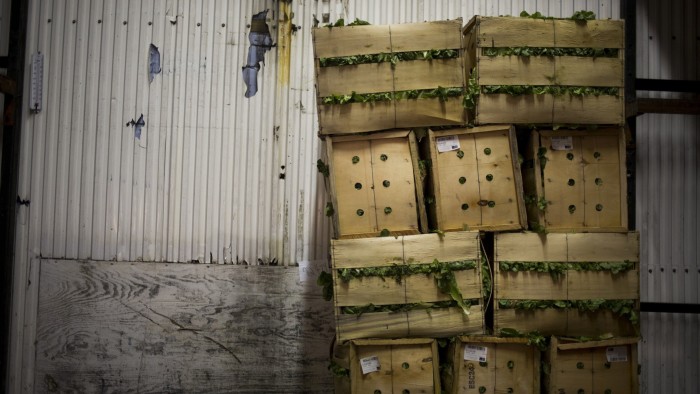US business leaders are warning that Donald Trump’s plan to deport millions of undocumented workers could create mass labour shortages, closing restaurants, crippling farms and small businesses, and raising prices.
Food producers, manufacturers and hotels were hiring lawyers to audit the legal status of their workers, said Amy Peck, an immigration attorney who represents employers at Jackson Lewis. They are also training staff on how to handle surprise visits from immigration authorities before Trump takes office in January.
“People are worried about the price of food now?” Peck said. “Wait until [food producers] can’t get workers.”
There were an estimated 11.7mn undocumented people in the US last year, according to the Center for Migration Studies. Foreign-born workers accounted for 18.6 per cent of the US workforce in 2023, according to the labour department, but it does not track their immigration status.
Tom Homan, the president-elect’s so-called border tsar, has said the incoming administration plans to begin deportations with the “worst first” — migrants who are in the country illegally and have been convicted of crimes.
Representative Dan Crenshaw, a Texas Republican and Trump ally, said at an Axios event on Wednesday that while he does not expect immigration authorities to go door to door to carry out deportations, “every once in a while” there could also be “round-up of a certain company” that hires undocumented workers.
Some of Homan’s previous comments on certain visa programmes have made business groups fearful that Trump could also attempt to slow legal immigration, saying that they will not be able replace their existing workforces with US citizens.
A representative of the Trump transition team did not immediately respond to a request for comment.
The agriculture sector was entirely reliant on the H-2A programme for temporary agricultural workers to recruit seasonal workers to harvest, said Jim Bair, the chief executive of the US Apple Association, a trade group for fruit farmers.
“Rarely does any US citizen show up to work and if they do, they quit after the first day because the job is too hard,” Bair said.
Business owners have long lobbied for expanded pathways for legal immigration. This includes simplifying the H-2A visa programme and expanding the number of migrants who can qualify for work authorisation through Temporary Protected Status, which allows people to enter the US from designated countries facing conflicts or disasters.
A coalition of agriculture groups backed legislation that would allow undocumented migrants to get work authorisation after paying a fine and agreeing to work on farms for a set amount of time, but it failed to gain momentum in the Senate despite bipartisan support in the House of Representatives.
“We need to provide a clear path to citizenship for [immigrants] and to create a path for undocumented workers — workers who, by the way, have worked, paid taxes and contributed to our economy for decades, to continue to contribute without fear of harassment or deportation,” said Adam Lampert, the chief executive of Dallas-based Cambridge Caregivers.
Cambridge employs 300 caregivers, and Lampert, who is also a member of the American Business Immigration Coalition, estimates that 80 per cent of them are foreign-born. Healthcare costs would soar without them, he said.
Food producers and hospitality executives say their industries would be the most affected by an immigration crackdown, but warn that construction groups and food delivery services would also struggle to replace their largely foreign-born workforces.
Sam Sanchez, the owner of Chicago-based restaurant group Third Coast Hospitality and a member of the board of the National Restaurant Association, told reporters at an ABIC event that he feared half of US restaurants would be forced to close without undocumented workers.
Research by the NRA found that 54 per cent of restaurant workers were in the US without documentation.
“If you’re going to deport them, these restaurants would close and we will see massive loss of revenue, income, and we will go on a downfall,” Sanchez said. “We believe that president Trump, as a business owner, will recognise this. We have good citizens, law abiding citizens. We want to make sure that they stay working.”
Healthcare executives also say that restricting immigration would exacerbate shortages of nurses and caregivers that have been slow to ease since the Covid crisis.
Danny Prosky, chief executive of American Healthcare Reit, which invests in nursing homes and medical office buildings, told investors on Wednesday that labour shortages were “the biggest pressure point” for businesses.
“I would say that if we start limiting the number of employees in the country, that’s probably not a good thing for our business,” Prosky said.
Some business leaders remain hopeful that their warnings will temper Trump’s plans.
“I think it’s clear that there’s going to be a bloodletting in January,” Lampert said. “I believe . . . that rational heads will prevail in the administration, because there are economists there too.”
Jenni Tilton-Flood, a dairy farmer with Flood Brothers Farm in Maine, is not as optimistic. Two-thirds of her farm’s workers are foreign-born and she fears that their proximity to the US-Canada border makes them easy targets for immigration authorities.
Deportations would leave her unable to care for her animals and upend the entire dairy industry, she said.
“There’s a lot of concern,” she said, “and there’s a lot of panic.”
Read the full article here

